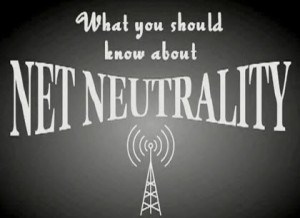 Wikipedia hosts a great definition of Net Neutrality. In a nutshell, it means:
Wikipedia hosts a great definition of Net Neutrality. In a nutshell, it means:
Internet service providers and governments should treat all data on the Internet equally, not discriminating or charging differentially by user, content, site, platform, application, type of attached equipment, and modes of communication.
There has been extensive debate about whether net neutrality should be required by law. Since the early 2000s, advocates of net neutrality and associated rules have raised concerns about the ability of broadband providers to use their last mile infrastructure to block Internet applications and content (e.g. websites, services, and protocols), and even block out competitors. (The term “net neutrality” didn’t come into popular use until several years later, however.) The possibility of regulations designed to mandate the neutrality of the Internet has been subject to fierce debate, especially in the United States.
The following is what happened, exactly, last week:
The Senate panel narrowly rejected strict Net neutrality rules today, dealing a grave setback to companies like eBay, Google and Amazon.com that had made enacting them a top political priority this year. By an 11-11 tie, the Senate Commerce Committee failed to approve a Democrat-backed amendment that would have ensured all Internet traffic is treated the same no matter what its “source” or “destination” might be. A majority was needed for the amendment to succeed.
Wired posted an article about this, too, among many others.
Access to websites used to be neutral. Google had as much priority to load quickly as your personal blog. Under the new rules, if you don’t pay as much as a competitor, for example, for priority connectivity to consumers’ browsers, your site will load way more slowly than the other guy’s. This is great news for some companies who support it, like Verizon and AT&T. What about others? How much would you be willing to pay to ensure your site is responsive and provides users a great experience? How many ways can this work against small and medium-sized businesses? What are the advantages of eliminating Net Neutrality? What are the disadvantages and how will they balance against the revenue it generates for big business? How will this affect a global culture over the long term?